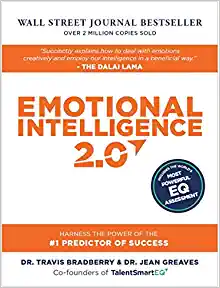
Employee burnout is a problem that has been around for a long time. However, due to the pandemic and the increased use of technology, employees are reporting alarmingly high burnout rates over the past few years. Fortunately, we can use emotional intelligence strategies to understand the contributing factors of burnout and hopefully prevent it from happening.
What are the signs of burnout?
Burnout signs are often related to disengagement, cynicism, stagnation, and mistakes. This can lead to retention problems, decreased productivity, and communication issues for teams and organizations. To prevent burnout, both the individual and organization must adopt simple strategies to increase engagement and address contributing factors.
It’s important to remember: burnout is not just fatigue, it is also:
- Physical exhaustion from exertion or prolonged work activity.
- Mental fatigue or brain fog, which can result from intense concentration, cognitive overload, or lack of mental stimulation.
- Emotional exhaustion, which can stem from long-term stress or emotional strain without taking enough time for self-care.
How can EQ help with burnout?
Emotional intelligence (EQ) is the ability to recognize and understand emotions and then use that awareness to manage yourself and your relationship with others. EQ is essential for managing burnout because it begins and ends with your wellbeing. Healthy individuals make healthy teams which leads to healthy cultures and healthy organizations. If we do not support employee wellbeing, burnout is more likely to impact the bottom line.
Distractions at work, such as constant notifications pinging your screen, can increase your stress levels and lead to disengagement. Emotional intelligence can help you handle these distractions and prevent burnout. For instance, by taking a moment to breathe deeply or finishing one task before checking your inbox for new messages, individuals can better manage their emotions and self-manage more effectively.
Here are our best strategies for preventing burnout:
Strategy #1: Visit Your Values
One way to prevent burnout is to visit your values. When you reflect on why a need is important to you and how it impacts your performance, you can identify whether your values are being served by your work. If your values are not being met, you may feel unmotivated, uninspired, or doubtful about the impact you can make. This lack of care for your work often surfaces as mistakes in the work itself, sometimes minor and sometimes major. Real or imagined futility and ineffectiveness are common sources of burnout for the individual. By checking in with yourself and your core beliefs that guide how you want to live, you can recognize whether your values surface daily. If your values are not served by the work you do, you may feel like you are not making a meaningful contribution.
Strategy #2: Breathe Right
Another way to prevent burnout is to breathe right. When worlds collide and personal distractions pull you away from work, you can do something as simple as breathe intentionally and deeply to fill your brain with fresh oxygen. Doing this routinely helps to calm your nerves, regulate your respiratory system, and allows you to concentrate. By enhancing your self-management, you can ensure your well-being, so you are in the best condition to perform at a high level in whatever you set out to do.
Strategy #3: When You Care, Show It
Finally, when you show appreciation and care for your colleagues and the organization, it can be a powerful way to prevent burnout. It is an emotional intelligence strategy that enhances your relationship management skills. When you care, you show it by demonstrating listening skills, diplomacy, and positively impacting the performance of others. Heightening your emotional intelligence can help you realign your values with those of others and the organization, resuscitate motivation, renew purpose, and move through feelings of burnout. This strategy also enriches your relationships and increases your sense of belonging.
Bottom Line
Emotional intelligence is a critical tool for managing burnout in the modern workplace. By recognizing and understanding emotions, individuals can better manage themselves and their relationships with others, leading to healthier individuals, teams, and organizations. Visiting your values, breathing right, and showing care are just a few strategies that individuals can use to prevent burnout.
By adopting these simple strategies and working with organizations that prioritize employee well-being, individuals can increase engagement and prevent burnout. Ultimately, investing in emotional intelligence training programs and instituting a rewards system for employees’ ability to manage work relationships well can help promote a culture of engagement and accountability.
Do you have a copy of Emotional Intelligence 2.0? 
Transform your life with Emotional Intelligence 2.0. Boost your EQ and learn to navigate complexities, manage behavior, and make better decisions. Order now to unlock your full potential.
About the Author
By Josh Rosenthal, Director of Training for TalentSmartEQ. For more information, please check out additional resources at: www.talentsmarteq.com.
These strategies were adapted from the book, “Emotional Intelligence 2.0” by Dr. Travis Bradberry & Dr. Jean Greaves. For more strategies that can help you reduce burnout, please check out our training programs or contact us.